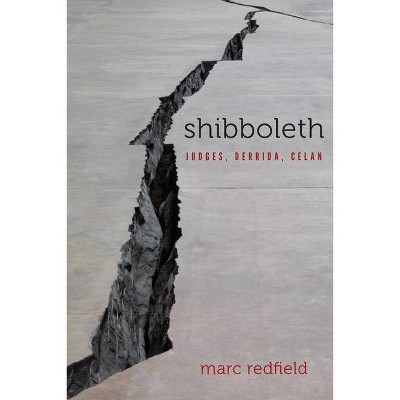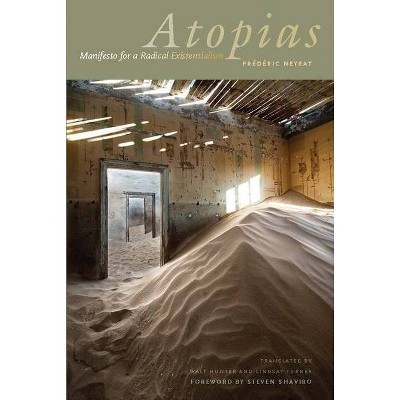Shibboleth - (Lit Z) by Marc Redfield (Paperback)

Similar Products
Products of same category from the store
AllProduct info
<p/><br></br><p><b> About the Book </b></p></br></br>"Working from the Bible to contemporary art, Shibboleth surveys the politics of border crossings, the policing of identities, and the linguistic performances on which such actions depend. In the Book of Judges, the Gileadites use the word shibboleth to target and kill members of a closely related tribe, the Ephraimites, who cannot pronounce the initial shin phoneme. In modern European languages, shibboleth has come to mean a hard-to-falsify sign that winnows identities and establishes and confirms borders. It has also acquired the ancillary meanings of slogan or clichâe. The semantic field of shibboleth thus seems keyed to the waning of the logos in an era of technical reproducibility-to the proliferation of technologies and practices of encryption, decryption, exclusion and inclusion that saturate modern life. The various phenomena we sum up as neoliberalism and globalization are unimaginable in the absence of shibboleth-technologies. In the context of an unending refugee crisis and a general displacement, monitoring and quarantining of populations within a global regime of technics, Paul Celan's subtle yet fierce reorientation of shibboleth merits scrupulous reading. This book interprets the episode in Judges together with Celan's poems and Jacques Derrida's reading of them, as well as passages from William Faulkner's Absalom! Absalom! and Doris Salcedo's 2007 installation Shibboleth at the Tate Modern. Redfield pursues the track of shibboleth: a word to which no language can properly lay claim-a word that is both less and more than a word, that signifies both the epitome and the ruin of border control technology, and that thus, despite its violent role in the Biblical story, offers a locus of poetico-political affirmation"--<p/><br></br><p><b> Book Synopsis </b></p></br></br><p><b>Working from the Bible to contemporary art, <i>Shibboleth</i> surveys the linguistic performances behind the politics of border crossings and the policing of identities.</b> <p/>In the Book of Judges, the Gileadites use the word <i>shibboleth</i> to target and kill members of a closely related tribe, the Ephraimites, who cannot pronounce the initial <i>shin</i> phoneme. In modern European languages, <i>shibboleth</i> has come to mean a hard-to-falsify sign that winnows identities and establishes and confirms borders. It has also acquired the ancillary meanings of slogan or cliché. The semantic field of <i>shibboleth</i> thus seems keyed to the waning of the logos in an era of technical reproducibility--to the proliferation of technologies and practices of encryption, decryption, exclusion and inclusion that saturate modern life. The various phenomena we sum up as neoliberalism and globalization are unimaginable in the absence of <i>shibboleth</i>-technologies. <p/>In the context of an unending refugee crisis and a general displacement, monitoring and quarantining of populations within a global regime of technics, Paul Celan's subtle yet fierce reorientation of <i>shibboleth</i> merits scrupulous reading. This book interprets the episode in Judges together with Celan's poems and Jacques Derrida's reading of them, as well as passages from William Faulkner's <i>Absalom, Absalom!</i> and Doris Salcedo's 2007 installation <i>Shibboleth</i> at the Tate Modern. Redfield pursues the track of <i>shibboleth</i>: a word to which no language can properly lay claim--a word that is both less and more than a word, that signifies both the epitome and the ruin of border control technology, and that thus, despite its violent role in the Biblical story, offers a locus of poetico-political affirmation.</p><p/><br></br><p><b> From the Back Cover </b></p></br></br><p>"<i>Shibboleth</i> is an important reflection on the politics of border crossings, the policing of identities, and the linguistic performances on which such actions depend. Working in two directions at once, Redfield makes the story of passwords and border patrols told in the biblical book of Judges relevant to our present moment while at the same time using the work of Derrida, Celan and Salcedo to draw attention to questions of legitimacy, inheritance, mass murder, autoimmunity, and civil strife at the heart of the biblical narrative."--Michael Levine, Rutgers University <p/>In the Book of Judges, the Gileadites use the word <i>shibboleth</i> to target and kill members of a closely related tribe, the Ephraimites, who cannot pronounce the initial <i>shin</i> phoneme. In modern European languages, <i>shibboleth</i> has come to mean a hard-to-falsify sign that winnows identities and establishes and confirms borders. The semantic field of <i>shibboleth</i> thus seems keyed to the waning of the logos in an era of technical reproducibility--to the proliferation of technologies and practices of encryption, decryption, exclusion and inclusion that saturate modern life. <p/>In the context of an unending refugee crisis and a general displacement, monitoring and quarantining of populations within a global regime of technics, Paul Celan's subtle yet fierce reorientation of <i>shibboleth</i> merits scrupulous reading. This book interprets the episode in Judges together with modern works by Celan, Jacques Derrida, William Faulkner, and Doris Salcedo. Redfield pursues the track of <i>shibboleth</i>: a word to which no language can properly lay claim--a word that is both less and more than a word, that signifies both the epitome and the ruin of border control technology, and that thus, despite its violent role in the Biblical story, offers a locus of poetico-political affirmation. <p/><b>Marc Redfield</b> is Professor of Comparative Literature, English, and German Studies at Brown University.</p><p/><br></br><p><b> Review Quotes </b></p></br></br><br><i>Shibboleth</i> is an important reflection on the politics of border crossings, the policing of identities, and the linguistic performances on which such actions depend. Working in two directions at once, Redfield makes the story of passwords and border patrols told in the biblical book of Judges relevant to our present moment while at the same time using the work of Derrida, Celan, and Salcedo to draw attention to questions of legitimacy, inheritance, mass murder, autoimmunity, and civil strife at the heart of the biblical narrative.<b>---Michael Levine, Rutgers University, <i></i></b><br><p/><br></br><p><b> About the Author </b></p></br></br><b>Marc Redfield</b> is Chair of the Department of Comparative Literature and Professor of Comparative Literature, English, and German at Brown University. His most recent books are The <i>Rhetoric of Terror: Reflections on 9/11 and the War on Terror</i> (Fordham University Press, 2009) and <i>Theory at Yale: The Strange Case of Deconstruction in America</i> (Fordham University Press, 2016).
Price History
Cheapest price in the interval: 28.49 on October 23, 2021
Most expensive price in the interval: 28.49 on November 8, 2021
Price Archive shows prices from various stores, lets you see history and find the cheapest. There is no actual sale on the website. For all support, inquiry and suggestion messagescommunication@pricearchive.us



















